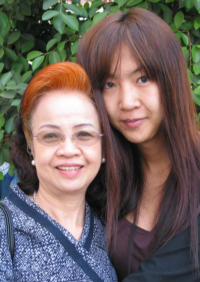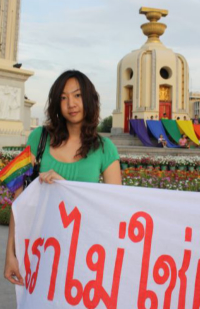A Human Rights Struggle at the Heart of the AIDS Epidemic
MSM ACTIVIST WAGES A PERSONAL BATTLE

Hua Boonyapisomparn with her mother, Boonyok, whose unconditional support has given Hua the confidence to be open about her transgender identity. (Photo: Sanitsuda Ekachal) |
July 2009–For Hua Boonyapisomparn, fighting for human rights is central to her work on HIV/AIDS among men who have sex with men (MSM)–but it is also a deeply personal battle. As a transgender person, she has often felt the lash of stigma and discrimination because of her identity. In fact, her experience with stigma led her to a career as an activist.
"In Asia, there are few career opportunities for transgender people apart from stereotypical jobs in entertainment venues or beauty salons," she says. "After I got my university degree in business, I found no one would hire me. But I'd been involved in LGBT activism as a volunteer, and I ended up working in the field full-time."
Her personal struggles have inspired Hua in her role as MSM program coordinator for TREAT Asia. "The basic problems of sexual minorities in Asia are the same everywhere: stigma and a lack of human rights," she explains. "This is an issue for every MSM organization. They have to figure out how to change attitudes within society."
At TREAT Asia, Hua works with the Purple Sky Network, a network of MSM groups in the Greater Mekong Sub-region, for which TREAT Asia serves as regional coordinating secretariat. Hua's role as an advocate for MSM is not a new one for her. Prior to joining TREAT Asia in March, she oversaw outreach, prevention, and advocacy at several organizations including the Rainbow Sky Association of Thailand and Sisters, a support group for transgender sex workers. "There were few transgender people involved in HIV/AIDS activism when I started," she says, emphasizing the need for new and diverse voices in the fight against AIDS.
With Hua's help, advocacy will be one of the Purple Sky Network's highest priorities during the next two years. As the group's facilitator, she currently provides technical support to community-based and nongovernmental organizations (NGOs) that offer much-needed havens for MSM to gather and seek support and information about HIV/AIDS and other issues. But many gaps in services remain, and in some countries there is little coordination between donors and program implementing agencies on MSM work, leading to unnecessary duplication of efforts.
The Purple Sky Network's expanding MSM advocacy project, supported by a grant from the Levi Strauss Foundation through amfAR's MSM Initiative and the Health Policy Initiative (HPI), is being developed to address these challenges. The first phase of the project is the creation of a database known as the Purple Sky Network Regional Information System on MSM (PRISM), which will include data from network members, major donors, and national and international NGOs. Beginning this summer, the database will allow the network to assess the capacity-building needs of Greater Mekong MSM organizations and map existing resources.

As an activist, Hua
Boonyapisomparn has participated
in numerous rallies to raise awareness of HIV among MSM
in Thailand.
|
In the second phase of the project, Purple Sky member groups will use the data from PRISM to help shape their individual strategies for evidence-based advocacy and monitor the outcomes of their activities. Network members will also receive action-based advocacy training on a wide range of skills, including organizing policy meetings with government officials, donors, and local agencies, and developing campaigns to reduce stigma. Hua believes the PRISM database will be an important tool in convincing donors and governments to help alleviate the urgent problems facing MSM in the Greater Mekong Sub-region. Across Asia and the Pacific, MSM are much more likely to be infected with HIV than the general population; a 2009 paper in the journal Sexually Transmitted Diseases showed that prevalence among MSM in urban areas ranged from 5.5 percent to 28.3 percent in Thailand and Cambodia, and up to 9.4 percent in some parts of Vietnam and China.
Community involvement in the development and implementation of programs, as well as in advocating for expanded services, is a key element to strengthening HIV prevention and care for MSM and others affected by the virus. Hua recently addressed this topic in a plenary presentation at the International Congress on AIDS in Asia and the Pacific (ICAAP), in which she stressed the need for collaboration between health systems and the communities they serve, and offered examples of successful programs in India, Thailand, and China for which TREAT Asia provides technical support.
Hua also recognizes that her work includes broadening understanding of MSM as a community and an identity. "I think that when we work on the issue of HIV/AIDS and MSM, we are not dealing with one problem that has one solution," she explains. "There are different contexts for each group of people, and specific health issues."
This rich diversity within the global MSM community is something Hua deeply appreciates. "When you work in this field," she explains, "you meet so many different people at all levels of society. I've learned so much about sexual minorities, about HIV, and understanding people's gender identity and sexuality." For Hua, the importance of the work she does with HIV and MSM comes down to this–the personal stories that lie at the heart of human rights.